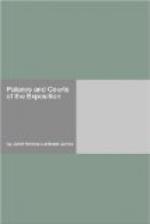Oh the other side is the fine formal fountain of “El Dorado,” by Gertrude Vanderbilt Whitney of New York.
The fountain of El Dorado brings to mind the old Indian legend of El Dorado, the Gilded One:
There was once among the South American tribes a belief that in a certain far-off country lived a king called El Dorado, the Gilded One. He ruled over a region where gold and precious stones were found in abundance.
The story influenced a vast number of adventurers who led expeditions to seek the land of golden treasure, but, notwithstanding the fact that they searched most carefully and for long periods, they all failed to find it.
The idea of the unattainable gave the suggestion to Mrs. Whitney for her fountain.
The gold of El Dorado was used as the symbol of all material advantages which we so strongly desire — wealth, power, fame, etc.
In the panels are seen the men and women of life in their mad race for the unattainable.
Many have had a glimpse of El Dorado, the Gilded One, and are rushing on to pass the mysterious gate behind which the desires of life await them.
Some faint by the roadside or stop in their race for the goal to contend or to loiter by the way, but those nearest the El Dorado increase their speed — rush madly on.
Beside the gateway that has only just allowed the fabled El Dorado, the Gilded One, to pass through are two mortals who have come close to the land of their desires, but only to find the door shut and slaves beside it barring the way. Their strength is expended, their courage gone in the long race for material things. The panels of this fountain tell us in satirical language something we can profitably think over and realize if we will.
-
The Ethical Side of the Court of the Universe
After man has created the great “Isthmian Way,” it is well to think on his fine ethical standards.
Read on the triumphal arches these quotations on truth, honor, justice, wisdom:
(Spain)
“Truth, witness of the past, counsellor of the present, guide of the future.” (Cervantes in Don Quixote.) East side of Arch of the Setting Sun.
(China)
“They who know the truth are not equal to those who love it.” (Confucius from the Confucian Analects translated by James Legge.) West side of the Arch of the Rising Sun.
(Arabia)
“He that honors not himself lacks honor where soe’er he goes.” (From the “Mu’allaqua” of Zuhayr ibn Abi Sulma translated by Reynold A. Nicholson.) East side of the Arch of the Rising Sun.
(Italy)
“The world is in its most excellent state when justice is supreme.” (Dante Purgatoria.) West side of the Arch of the Setting Sun.
(Siam)
“A wise man teaches, be not angry; from untrodden ways turn aside.” (From the sayings of Phra Ruang, Prince Ram Khamheng of Sukhothai.) East side of the Arch of the Rising Sun.




